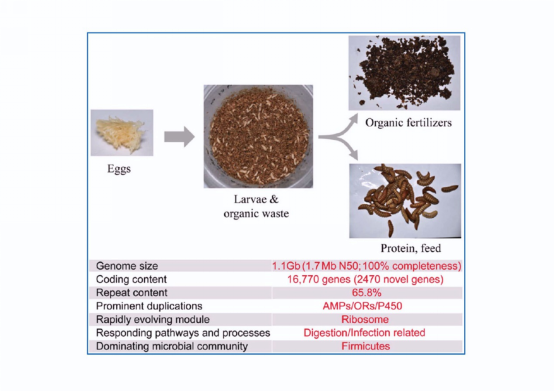Recently, Professor Zhang Jibin’s team of the College of Life Science and Technology in Huazhong Agricultural University and Huang Yongping’s team from the Shanghai Institute of Plant Physiology, Academy of Science cooperated to perform the genome and genomic landscape for the 10-generation inbred line of black soldier fly(BSF),Hermetia illucen Wuhan strain, reveal the mechanism that BSF can efficiently convert organic wastes in harsh environment such as livestock manure by analyzing intestinal microbiome. The results were published online on November 25 in the journal Cell Research.
With the rapid growth of the global population and organic wastes such as kitchen waste, livestock and poultry waste. FAO calls on the world to use edible insects to utilize organic waste more efficient. It could meet the requirement of livestock and human to feed and food and also could purify the environment.The development of excellent BSF strains and its industrial application has become research hotspot.

Prof. Yu Ziniu and Prof. Zhang Jibin introduced the BSF breeding technology from Texas A&M University in the United States. They collected wild BSF from different regions in China for indoor domestication, and 3 years hard working successfully obtained highly efficient BSF Wuhan strain with independent intellectual property rights. They solved the key technology of large-scale breeding of BSF, and developed a new process of the co-conversion of BSF and microorganisms. Subsequently, Zhang Jibin’team and Huang Yongping’s team together obtained a high quality BSF genome, and analyzed the intestinal microbiome of BSF converting different organic wastes, revealing the mechanism that how BSF can efficiently convert organic wastes in harsh environment.

They further developed a method based on CRISPR / Cas9 gene editing, obtained strains without flight ability and breeding easier. It laid a foundation for the applied basic research of BSF, the development of excellent strains and the industrial application of organic waste BSF conversion.
Associate Professor Cai Minmin from our university is the co-first author of the paper, and Professor Zhang Jibin and Professor Huang Yongping of the Shanghai Institute of Plant Physiology of the Chinese Academy of Sciences are the co-corresponding authors. This research was funded by the National Key Technology R&D Program of China in the 13th Five-Year plan, the Top Foreign Expert Project of State Bureau of Foreign Experts Affairs and the Chinese Academy of Sciences.
source:https://www.nature.com/articles/s41422-019-0252-6
Provided by Yu Yongqiang and Zhang Jia from College of Life Science and Technology, Huazhong Agricultural University
Proofread by Zhang Jibin